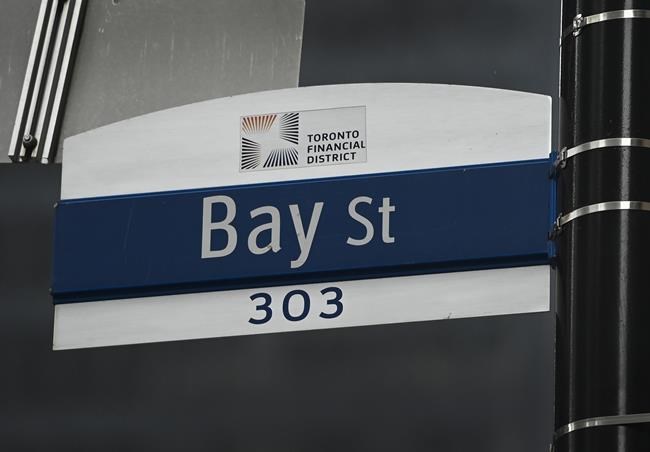CALGARY — North American markets rallied Wednesday against the backdrop of another day of strong corporate earnings as well as easing investor anxiety about U.S.-China relations.
The S&P/TSX composite index closed up 40.61 points at 19,545.94.
In New York, the Dow Jones industrial average was up 416.33 points at 32,810.50. The S&P 500 index closed up 63.98 points at 4,155.17, while the Nasdaq composite closed up 319.40 points at 12,668.16.
The gains followed a risk-off trading day on Tuesday, when both Canada's main stock index as well as U.S. markets closed in the red. Tuesday's losses were at least partly attributable to U.S. House Speaker Nancy Pelosi's much-publicized visit to Taiwan, which had ratcheted up U.S. tensions with China and led some investors to worry about potential international trade implications.
Pelosi had departed Taiwan by Wednesday and the lack of immediate repercussions from Beijing appeared to be easing investor fears. However, Greg Taylor, chief investment officer with Purpose Investments, said Wednesday's market rally — particularly in the U.S. tech sector — was strong enough that it can't be chalked up solely to the Pelosi situation.
"There were some expectations that the markets would bounce back today," Taylor said.
"But it was a little more than most people were expecting, and I think a lot of people are somewhat scratching their heads over what’s caused this buying appetite today.”
One factor behind the unexpected bounce could be another encouraging batch of earnings from some of the biggest companies south of the border.
U.S. drugstore chain CVS rose 6.3 per cent after reporting solid financial results and raising its profit forecast for the year. Starbucks rose 4.3 per cent after also reporting solid financial results.
Nearly three-quarters of companies within the benchmark S&P 500 have reported earnings for the latest quarter and the results have mostly beaten analysts' forecasts.
"Heading into the last few weeks, the markets were really concerned that this earnings season would be more ugly than it has been," Taylor said.
"But now we’re pretty much 70 per cent through this U.S. earnings season, and it hasn’t been perfect, but it didn’t need to be perfect. It’s actually been a little better than feared, and I think that’s caused a little bit of a relief rally."
In Canada, health care, tech, and financials won the day, while mining stocks and in particular energy suffered losses. As the benchmark West Texas International crude price tumbled almost four per cent on Tuesday to close at $90.91, the S&P/TSX capped energy index lost 4.22 per cent.
Several Canadian energy companies — including Paramount Resources Ltd., MEG Energy Corp., and Athabasca Oil Corp. — lost between eight and 10 per cent of their share price value on Tuesday.
Taylor said the decline in oil prices was largely caused by new inventory data from the U.S. Energy Information Administration, which showed an unexpected rise in crude oil inventories and a possible easing of demand.
"This is also a soft time for oil prices in general. It's getting later in the summer and driving season is pretty much over," Taylor said.
He added while crude oil has eased off significantly in recent weeks, with no end in sight to the Russia-Ukraine war, there will still be a lot of uncertainty relating to energy demand heading into the fall and winter.
"There's really not a lot of new supply that can come on out there . . . so it's hard to see oil pulling back materially," he said, adding Canadian energy companies are still very profitable at the current oil price.
"I think as long as oil can hold at that $75 to $80 range . . . it's probably setting up for a decent second half of the year."
Later this week, investors will have their eye on U.S. and Canadian payroll data expected Friday. Taylor said weaker-than-expected payroll data could actually be good news for markets, as it might convince central banks to take a breather from a spate of recent interest rate hikes.
Investors will also be looking ahead to U.S. inflation data, coming next week.
"That will give more insight as to if we're getting a little bit closer to this peak of inflation that everyone's hoping we are," he said.
The Canadian dollar traded for 77.80 cents US compared with 77.78 cents US on Tuesday.
The September crude contract was down US$3.76 at US$90.66 per barrel and the September natural gas contract was up 56 cents at US$8.27.
The October gold contract was down US$13.30 at US$1,776.40 an ounce and the September copper contract was down five cents at US$3.47 a pound.
This report by The Canadian Press was first published Aug. 3, 2022.
Companies in this story: (TSX:GSPTSE, TSX:CADUSD=X)
Amanda Stephenson, The Canadian Press



